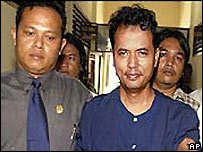
Indonesia needs to keep closer tabs on a flourishing publishing network linked to the militant group Jemaah Islamiyah, which reflects a debate on tactics among Islamic extremists, an International Crisis Group report said Friday.
It said the profitable book business had been growing at a time when Jemaah Islamiyah, a regional network blamed for a string of deadly attacks in Indonesia including the 2002 Bali bombings, had been weakened and appeared to be rebuilding.The increase in publications, which indicate a debate within Jemaah Islamiyah over the desirability of using Qaeda tactics, could be a sign that the organization was trying to rebuild by focusing on religious outreach and recruitment, the report said."These publishers are disseminating a radical message, but they also may be playing a positive role by channeling JI energies into jihad through the printed word rather than through acts of violence," said Sidney Jones of the International Crisis Group, a prominent Jakarta-based authority on Jemaah Islamiyah.The report said that banning publications, which are often Arabic translations and include titles like "Join the caravan of martyrs" or "Becoming an infidel without knowing it" would be counterproductive, but there was a need for more scrutiny.As well as being a possible recruiting tool, the report said the publishing web based around the central Java town of Solo illustrated the social network holding Jemaah Islamiyah together and helped explain the ability of Jemaah Islamiyah to rebound from setbacks.
Alert for terror suspect Interpol said Friday it had issued a worldwide security alert following the escape of a man from a jail in Singapore who is suspected of being an Islamic terror leader, The Associated Press reported from Singapore.The international police organization said it put out an "Orange Notice" on Mas Selamat Kastari, suspected of being a commander of the Qaeda-linked Jemaah Islamiyah's Singapore arm. Kastari, 47, who is accused of once plotting to hijack a plane and crash it into Singapore's international airport, escaped from a detention center Wednesday.
Comments